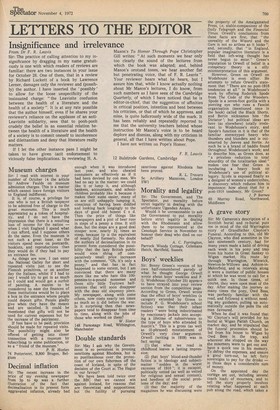Sir: The recent increase in the Price of my evening
newspaper from 3p to 4p was a further illustration of the fact that decimalisation in its present form aggravated inflation, already bad enough when it was introduced last year, and also cheated consumers as effectively as if it had been devised by con men. We had no say in the matter: we could like it or lump it, and although bankers, accountants, and schoolchildren probably like it because it makes their sums easier, many of us are still unhappily lumping it, conscious of having been diddled and looking back longingly to the days of good old honest s d. Then the price of things like newspapers and a pint of beer rose in steps of a penny a time. It still does, but the steps are a good deal steeper now, nearly 2i times as steep, because lp is the equivalent of nearly 21c1 formerly. No doubt the authors of decimalisation in its present form considered the possibility that the lazy British public would soon shrug off comparatively small price increases with the comment, "Oh, it's only a penny," and that has in fact happened to some extent, but I am convinced that there are many more like me who hate this 100pennies-to-a-pound nonsense and those silly little Toytown halfpennies that will soon disappear with the dear old sixpenny piece. My newspaper, along with some others, now costs nearly ten times as much as it did before the war. Is it surprising then that newspapers tend to disappear from time to time, along with the jobs of those who worked on them?
W. Slater 148 Parsonage Road, Withington, Manchester








































 Previous page
Previous page